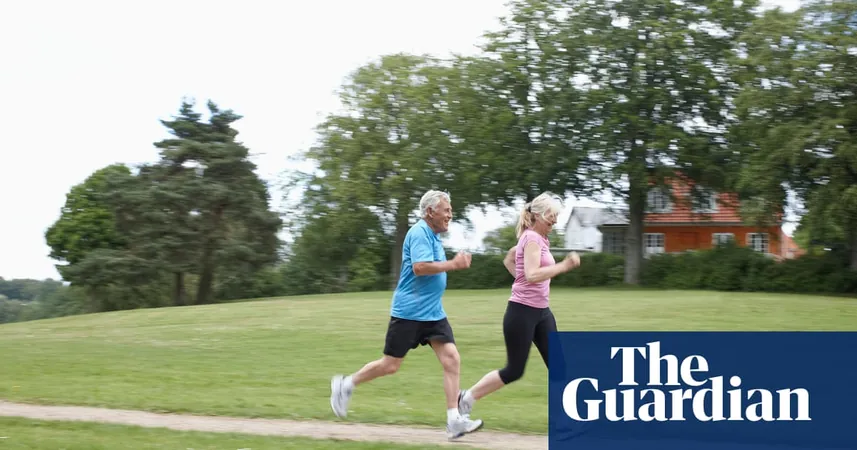
Unlocking Your Brain’s Potential: How Physical Fitness Reduces Dementia Risk
2024-11-19
Author: Jia
Introduction
Recent research has unveiled an exciting breakthrough: maintaining physical fitness can significantly lower the risk of dementia, potentially delaying its onset by nearly 18 months! This revelation sheds light on the profound impact of regular exercise in enhancing brain health and cognitive function.
The Study
A comprehensive study published in the prestigious British Journal of Sports Medicine reveals that individuals exhibiting higher levels of cardiorespiratory fitness (CRF) experienced not only improved cognitive function but also a reduced likelihood of developing dementia. This is particularly vital as it offers hope for those genetically predisposed to dementia, with findings indicating that their risk can be decreased by up to a staggering 35%.
Study Details
The groundbreaking analysis involved a remarkable cohort of 61,214 participants aged between 39 and 70, who were initially part of the UK Biobank study from 2009-2010. None of the participants had dementia at enrollment, and they were meticulously monitored for up to 12 years to track their health evolution. During the study, participants undertook a six-minute fitness test on a stationary bike, while their cognitive capabilities were assessed through neuropsychological evaluations. Their genetic risk of dementia, particularly Alzheimer's disease, was measured using a polygenic testing approach.
Key Findings
The research team, led by the esteemed Prof. Weili Wu from the Karolinska Institute in Stockholm, concluded, “Higher CRF is associated with better cognitive function and decreased dementia risk.” They noted that enhanced CRF can mitigate the genetic risk factor for dementia by about 35%, and it appears to delay the onset of dementia by approximately 1.48 years throughout middle and older age.
Expert Opinions
Experts in dementia research have applauded these findings as a compelling confirmation that maintaining an active lifestyle can substantially reduce risk. Dr. Richard Oakley from the Alzheimer’s Society highlighted, “This research emphasizes the importance of exercise as a critical component of a healthy lifestyle and its potential to mitigate dementia risk later in life.
He underscored the encouraging aspect that exercise may also benefit those with a genetic predisposition for Alzheimer's disease.
Broader Context
An extensive report from The Lancet medical journal’s commission on dementia in July affirmed physical inactivity as one of the 14 established risk factors for dementia, including hearing loss, low levels of education, and social isolation.
Further Research Needed
Dr. Jacqui Hanley, head of research at Alzheimer’s Research UK, noted, “This new research highlights how good cardiorespiratory fitness—an essential measure of overall physical health—could help lower the risk of developing dementia in the future.” However, she cautioned that the exact mechanism linking CRF to reduced dementia risk remains to be fully understood, calling for further studies to clarify these connections.
Conclusion
Despite the observational nature of the findings and the absence of direct causality confirmation, the researchers assert that enhancing cardiorespiratory fitness could be a valuable strategy for dementia prevention, particularly for those with a high genetic predisposition to Alzheimer's disease.
In summary, the latest findings present a compelling argument for increasing physical activity as a proactive measure against dementia, opening doors to new discussions on how we can empower ourselves to protect our cognitive health as we age. So let's lace up our sneakers and take control of our brain health—because every step counts!


 Brasil (PT)
Brasil (PT)
 Canada (EN)
Canada (EN)
 Chile (ES)
Chile (ES)
 España (ES)
España (ES)
 France (FR)
France (FR)
 Hong Kong (EN)
Hong Kong (EN)
 Italia (IT)
Italia (IT)
 日本 (JA)
日本 (JA)
 Magyarország (HU)
Magyarország (HU)
 Norge (NO)
Norge (NO)
 Polska (PL)
Polska (PL)
 Schweiz (DE)
Schweiz (DE)
 Singapore (EN)
Singapore (EN)
 Sverige (SV)
Sverige (SV)
 Suomi (FI)
Suomi (FI)
 Türkiye (TR)
Türkiye (TR)